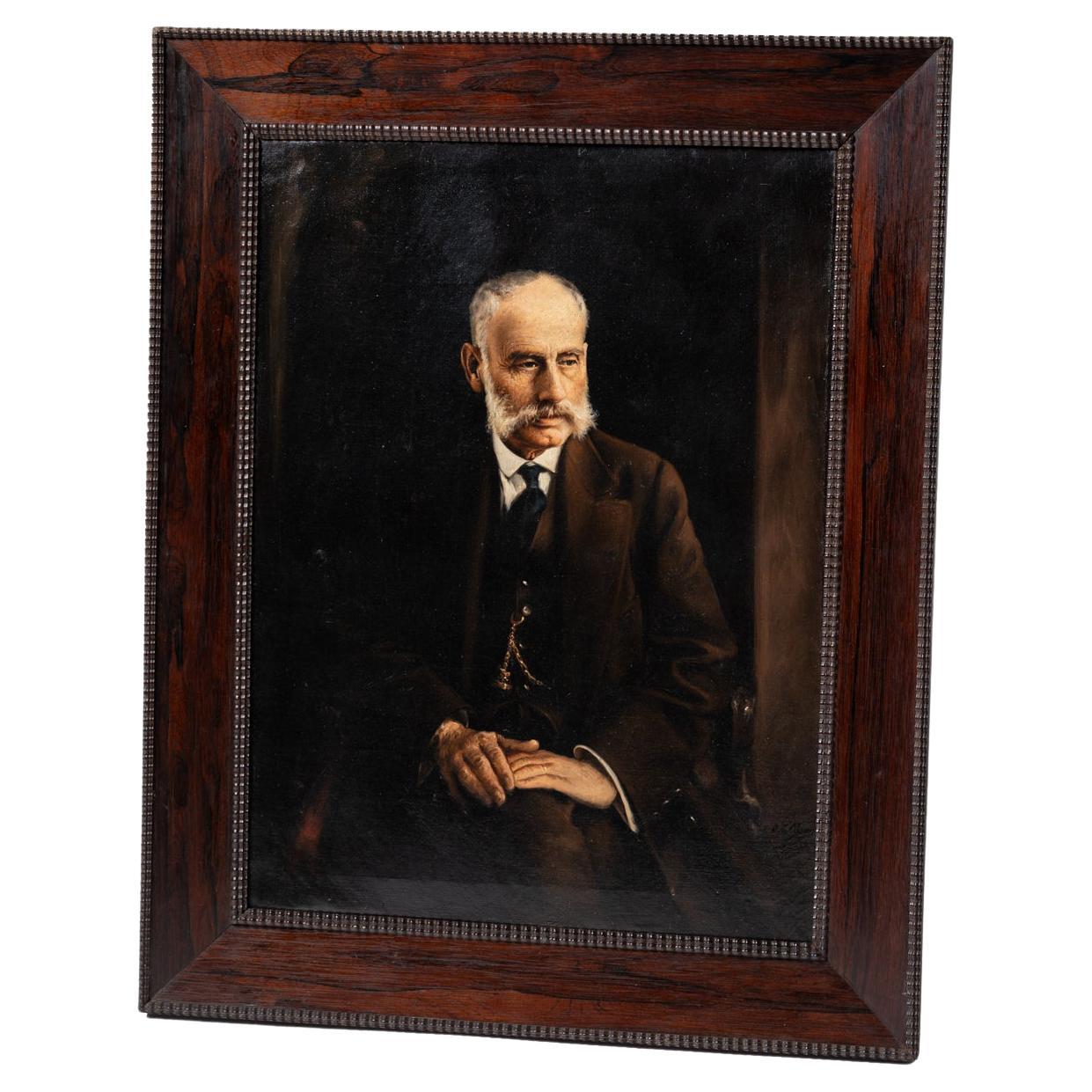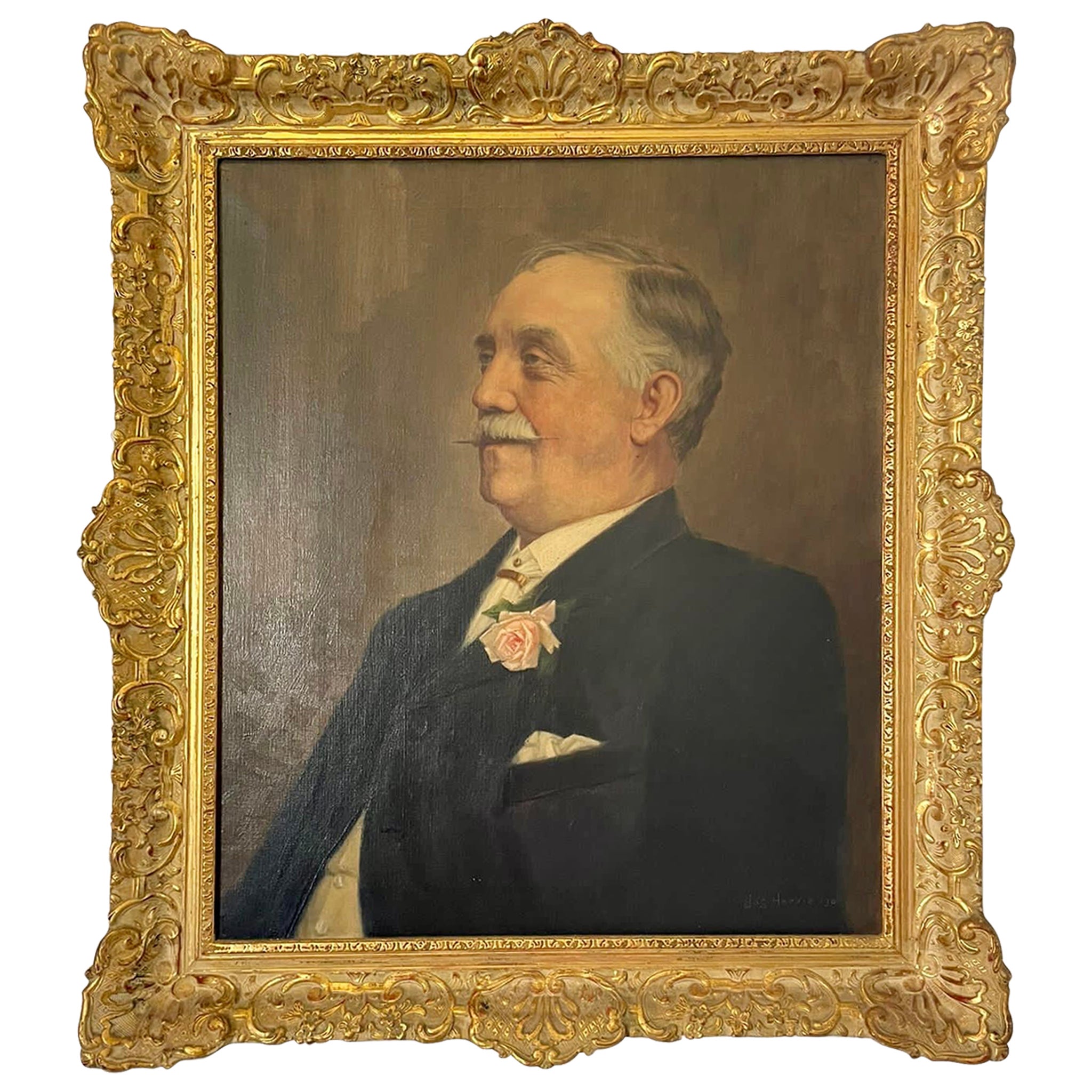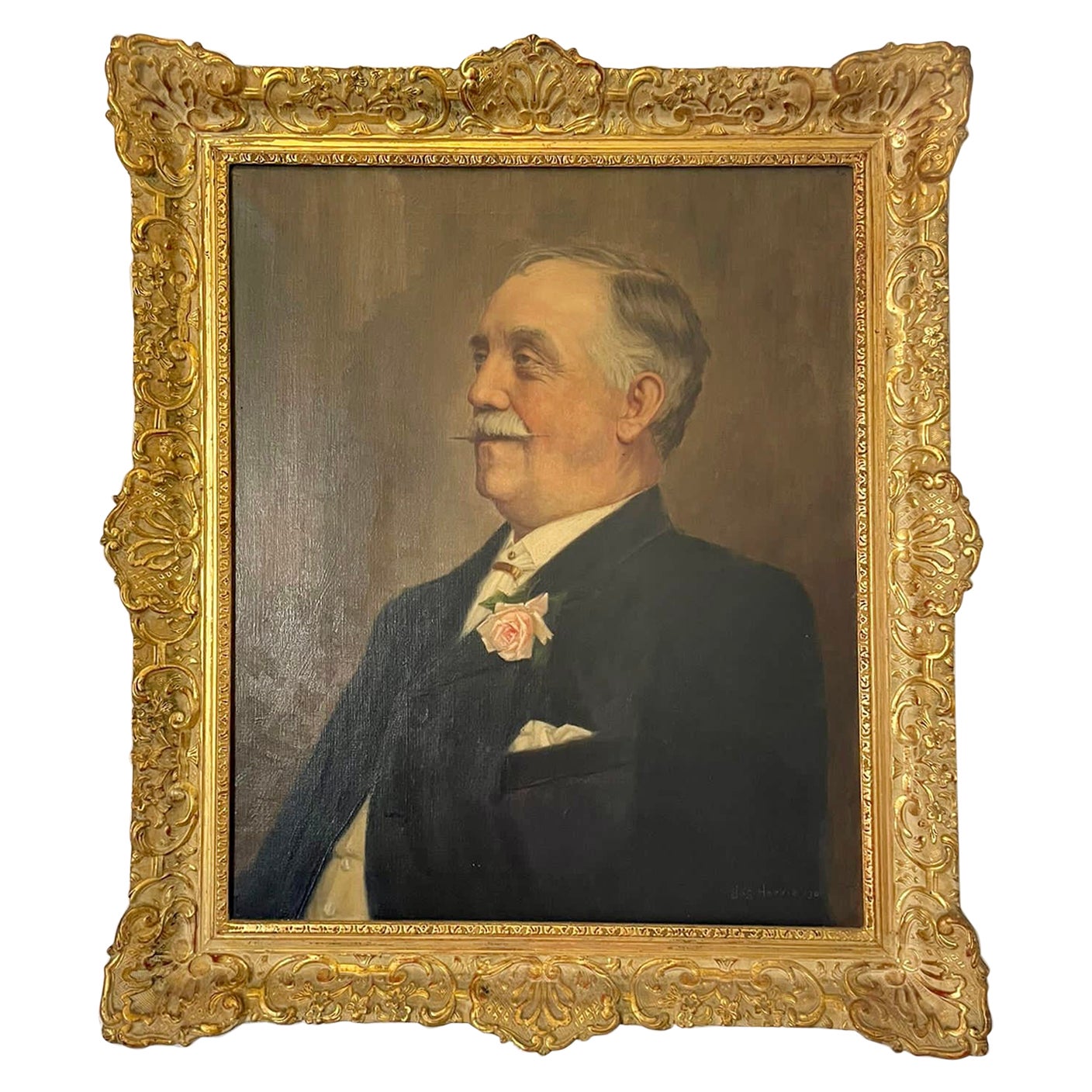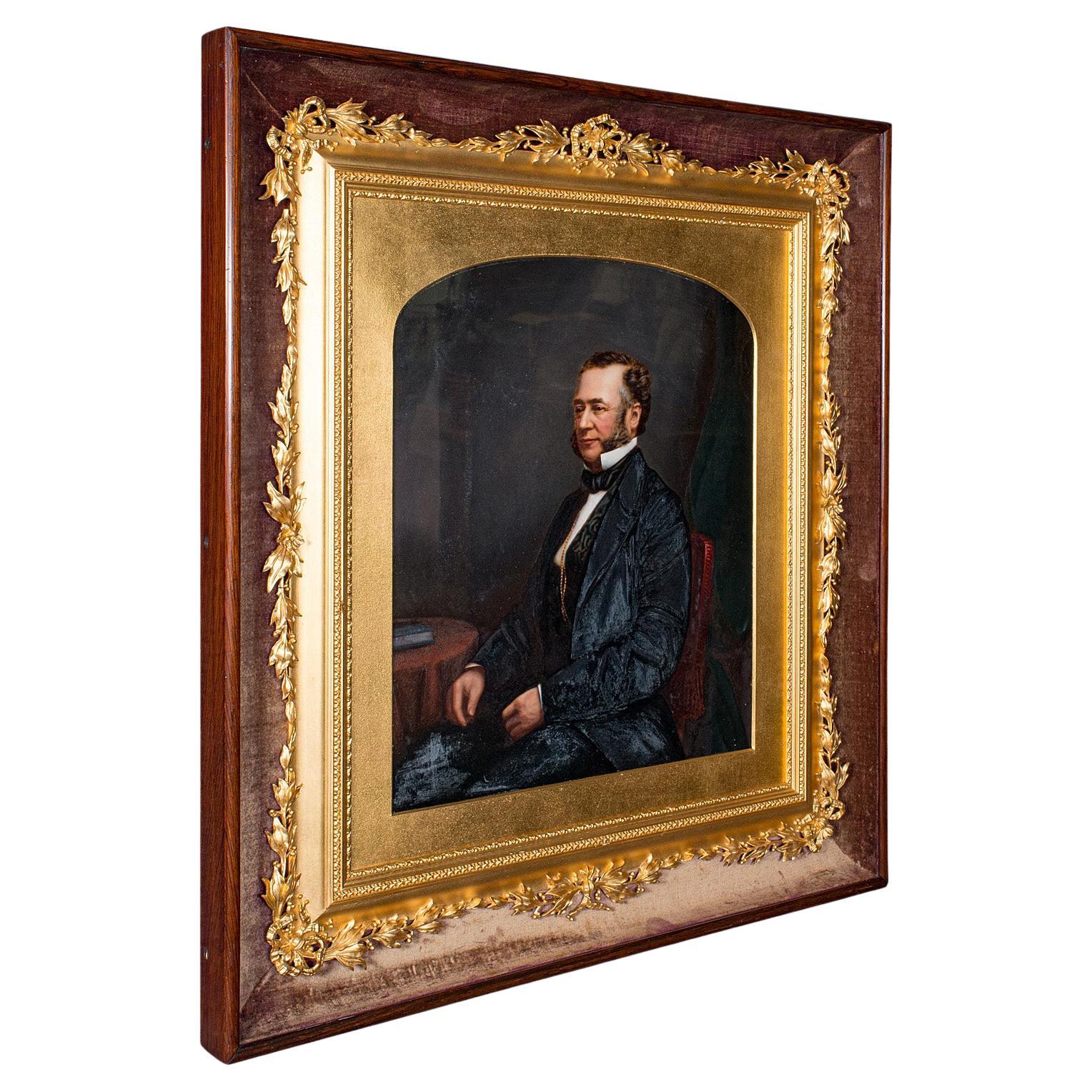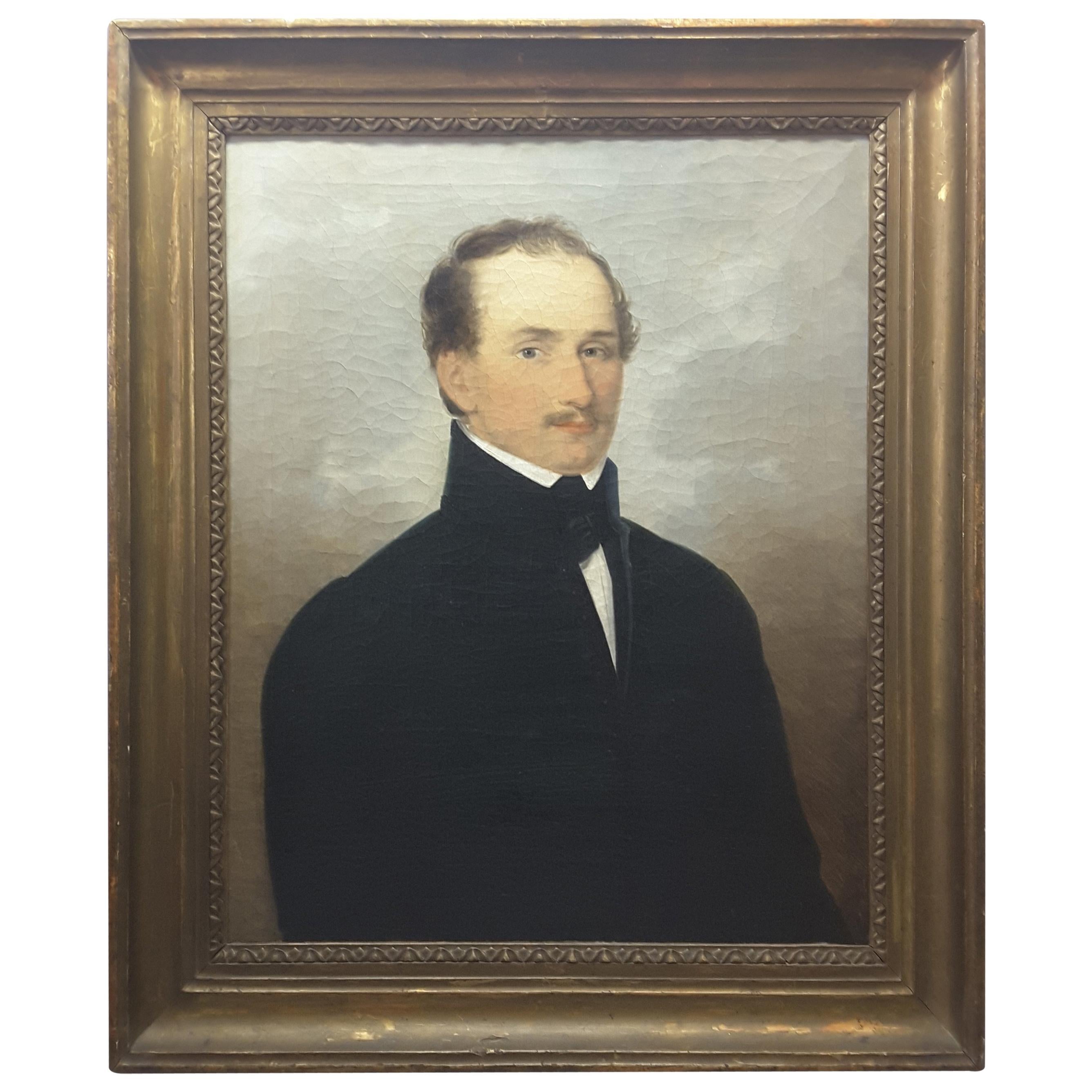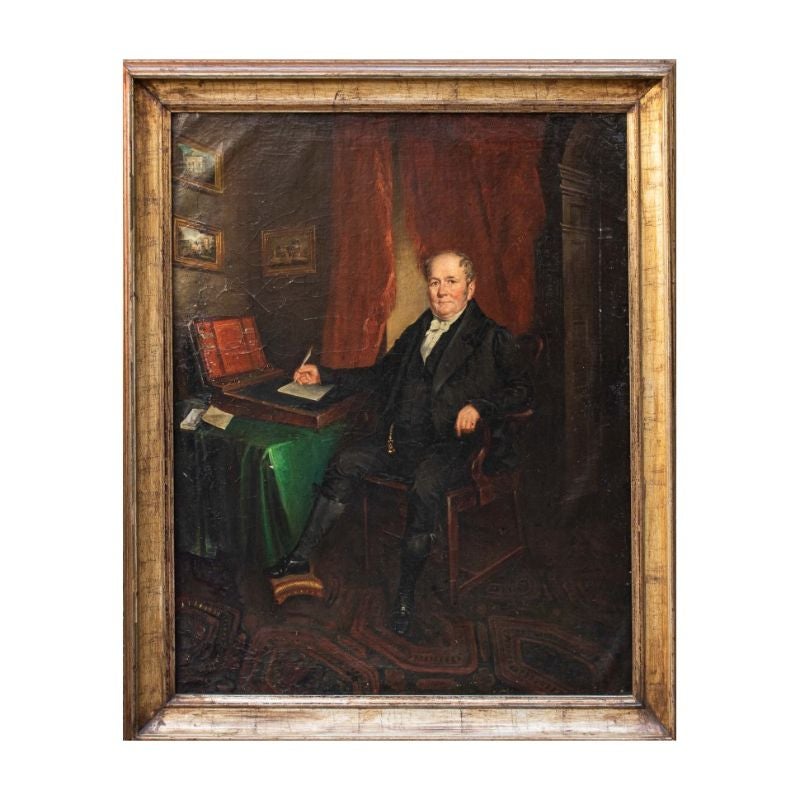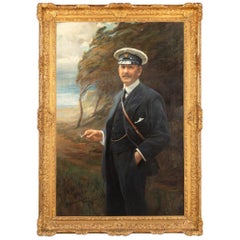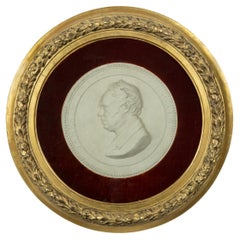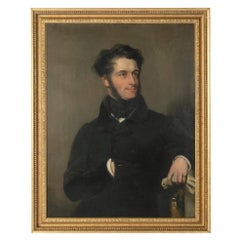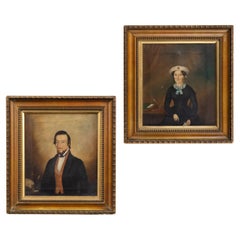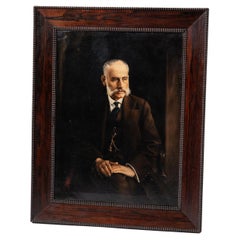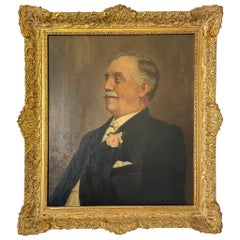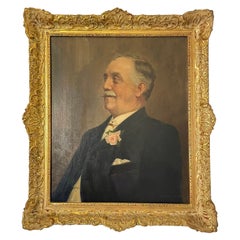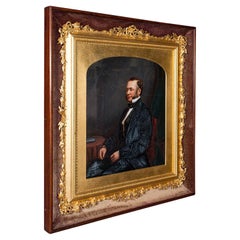Items Similar to A large portrait of Provost Samuel Leckie by William A. Donnelly 1901
Want more images or videos?
Request additional images or videos from the seller
1 of 6
A large portrait of Provost Samuel Leckie by William A. Donnelly 1901
$17,550.92
£12,750
€14,988.76
CA$24,278.78
A$26,756.90
CHF 14,008.12
MX$328,659.23
NOK 176,015.11
SEK 164,736.14
DKK 111,912.27
About the Item
A large portrait of Provost Samuel Leckie as he was presented to Queen Victoria in 1897, William A. Donnelly, 1901, gouache and watercolour showing a large bearded man in court dress of a black coat, knee breeches, stockings and elaborately ruffled shirt and cuffs, with silver-buckled shoes, holding a bicorne and a sword, standing before a balustrade with a park landscape receding into the distance behind, within a gild frame, signed, dated 1901 and inscribed ‘Provost Leckie as he was presented to Her Most Gracious Majesty THE QUEEN at Buckingham Palace. London, 1897.’
Provenance: A private European collection
Footnote: This interesting and extremely large scale portrait is a new addition to the small corpus of known works by the Victorian artist William A. Donnelly (1847-1905). It depicts the Provost, essentially the ceremonial Mayor, Samuel Leckie (d. 1912). The Leckie family were ironmongers by profession and hailed originally from Montrose. However, Samuel seems to have spent most of his career in and around the Glasgow and Clydebank area. He was Chief Magistrate and served the public in many other capacities for a period of 25 years. He is perhaps best remembered today for his extraordinarily generous donation, in 1907, of a grand 18 foot high cast iron drinking fountain to Dalmuir Park in Clydebank, where it still stands today.
Our painting states that it depicts the Provost as he was presented to Her Majesty at Buckingham Palace in 1897. Given the date, this is highly likely to have formed part of the Queen’s Diamond Jubilee celebrations that year with various civic dignitaries visiting the monarch to pay their respects on behalf of their towns and cities. It is likely that the sitter’s importance in civic society, and the sheer size of the piece, means it was commissioned by his ex-council to hang in their chambers or another civic building. As will be discussed below,
William A. Donnelly (1847-1905) came from an artistic family. His grandfather and great grandfather had been in the printers and his father was a pattern designer who ran a successful fashion business in Glasgow. Indeed, Donelly was described by the journalist and art critic, Neil Munro, as a man whose ‘sartorial splendour made him in Glasgow the most conspicuous artist of his time’. This gave Willam junior access to Royal circles, and he received a number of commissions from the Royal family. His fame increased beyond Scotland with his appointment, as Scottish correspondent, to the Illustrated London News. Sadly, Donnelly developed an interest in archaeology which was to prove his undoing. In 1898 he discovered what he thought was an early settlement on the banks of the Clyde, complete with what he believed to be authentic carved artefacts. These were dismissed as fakes by some eminent experts of the time and, although there is no suggestion that Donnelly himself made the fakes, the repercussions led to ill health and, according to his son, ultimately to his early death. Very few paintings by Donnelly survive and those that do are primarily in two public collections; the Glasgow Museums Service and, most importantly in this context, the West Dunbartonshire Council Fine Art Collection. The author Alastair Mitchell owns a large watercolour and one of the artist’s sketchbooks.
- Dimensions:Height: 63.25 in (160.66 cm)Width: 45 in (114.3 cm)Depth: 2.5 in (6.35 cm)
- Materials and Techniques:
- Place of Origin:
- Period:
- Date of Manufacture:1901
- Condition:Wear consistent with age and use.
- Seller Location:Lymington, GB
- Reference Number:1stDibs: LU973042645342
About the Seller
5.0
Recognized Seller
These prestigious sellers are industry leaders and represent the highest echelon for item quality and design.
Gold Seller
Premium sellers maintaining a 4.3+ rating and 24-hour response times
Established in 1982
1stDibs seller since 2013
134 sales on 1stDibs
Typical response time: 2 hours
Associations
LAPADA - The Association of Arts & Antiques Dealers
- ShippingRetrieving quote...Shipping from: Lymington, United Kingdom
- Return Policy
Authenticity Guarantee
In the unlikely event there’s an issue with an item’s authenticity, contact us within 1 year for a full refund. DetailsMoney-Back Guarantee
If your item is not as described, is damaged in transit, or does not arrive, contact us within 7 days for a full refund. Details24-Hour Cancellation
You have a 24-hour grace period in which to reconsider your purchase, with no questions asked.Vetted Professional Sellers
Our world-class sellers must adhere to strict standards for service and quality, maintaining the integrity of our listings.Price-Match Guarantee
If you find that a seller listed the same item for a lower price elsewhere, we’ll match it.Trusted Global Delivery
Our best-in-class carrier network provides specialized shipping options worldwide, including custom delivery.More From This Seller
View AllMajor R Sloane-Stanley by George Hillyard Swinstead, 1916
Located in Lymington, Hampshire
This three-quarter length oil on canvas portrait shows Major Sloane-Stanley in a landscape by the sea. He is smoking a cigar and wearing a Royal Yacht Squadron cap. Signed lower left ‘G Hillyard Swinstead 1916’ the reverse inscribed in pencil ‘Major R Sloane-Stanley, Hants Yeomanry 1916’ . English.
Capt. thence Lt Col Ronald F A Sloane-Stanley of the Hampshire Regiment (1867 – 1948) served as Deputy Lord Lieutenant of Hampshire. As a close friend of Edward VII, he reputedly procured two billiard tables from Osborne House (East Cowes, Isle of Wight) for Lee- on-the-Solent Yacht Club, of which he was the founding Commodore in 1907. He was also a member of the Royal Yacht Squadron from 1907 until his death, owning seven yachts during that period. He served on the Yachting Committee between 1935 and 1946.
Despite Sloane-Stanley's long history of involvement with yachting, there is one yacht with which his family is associated that overshadows all of his other great achievements in the sport. The Formosa, built for his father Francis Sloane-Stanley in 1877, was acclaimed as a masterpiece of maritime design before she was even launched. In a rhapsodic article published on the 22nd of February 1879, The Field newspaper describes her as “the most beautiful cutter yacht ever built”.
In addition to her fine attributes as a racing vessel, the article also mentions the luxurious way that she was decorated inside, personally supervised and designed by Mrs Sloane-Stanley-our sitter's mother.
The Formosa, pictured above, became so famous that shortly after this article was written Francis Sloane-Stanley sold her to his friend the Prince of Wales (later Edward VII). There are several images of the Formosa in the Royal Collection, all dating from 1880. The Prince raced her on multiple occasions and her victories included the Queen's Cup on the 3rd of August 1880. By 1881, however, the Prince had sold her to a “Mr Bischoffsheim” as reported in the as reported in the Portsmouth Evening News on the 23rd of July of that year.
Although Ronald Sloane-Stanley would have been 12 at the time the Formosa was raced by his father it is highly likely that seeing this beautiful cutter, and the success that it brought to his family, would have inspired Ronald's own yachting career.
Additionally, as the same article in The Field makes clear, the Sloane-Stanley family were related in some way to Thomas Assheton-Smith, a founder member of the Yacht Club (later the Royal Yacht Squadron). The family is therefore a highly renowned one in yachting circles and we were lucky enough to be able to offer a silver gilt trophy won by Assheton Smith at the Regatta in 1828 in one of our previous catalogues. This portrait is a very exciting piece of yachting memorabilia as well as a superb work of art in its own right.
The Artist
George Hillyard Swinstead...
Category
Vintage 1910s English Paintings
Materials
Paint
A framed plaster portrait plaque of the Glasgow Reformist MP James Oswald, signe
Located in Lymington, Hampshire
A framed plaster portrait plaque of the Glasgow Reformist MP James Oswald, signed and dated Carlo Marochetti, 1842, of circular form, shown facing to the right within a black border and the original glazed giltwood frame.
Another version of this plaque is in the collection of Glasgow Museums and can be seen on the Art UK website
James Oswald (1779-1853) was a successful Glasgow merchant who later inherited various landed estates due to the early death of his cousin. Oswald was one of the first members of the Glasgow Bank when it was established in 1809. He traded largely in cotton and other raw textiles and in his spare time he commanded the Glasgow branch of the volunteer mounted Yeomanry. It was his political career however that captured the hearts of many of his countrymen and led to his eventually being immortalised in sculptural form.
The Liberal Party MP for Glasgow from 1832-1837, Oswald was a staunch opponent of Sir Robert Peel...
Category
Antique 1840s Decorative Art
Materials
Plaster
Andrew Morton R. A.: Captain George Treweeke Scobell, 1840
By Andrew Morton
Located in Lymington, Hampshire
This oil on canvas half portrait shows a bearded Capt. G.T. Scobell looking to his left and wearing a black frock coat with a high collar, a white shirt and wide cravat. His right ha...
Category
Antique 19th Century English Paintings
Materials
Canvas, Paint
Royal Naval Surgeon Robert Prideaux and His Wife Mary Ann
Located in Lymington, Hampshire
These charming English School portraits show the subjects half-length by a desk, the surgeon with a skull at his elbow and his wife with an open writing box. Oil on canvas within a gilded frame and accompanied by five related letters. English, circa 1810.
Footnote: Robert Prideaux died aged 36 in 1818 but in his short life he managed to rise rapidly through the ranks as a naval surgeon. The Naval Chronicle Vol. 19 (1808) records his appointment as a surgeon, aged only 26, on the cutter Sprightly and that he moved to the Lily by the end of the same year. In 1809, a member of the crew of the vessel Polyphemus was involved in a drunken incident that culminated in him being sick on the quarter-deck of the Lily whilst both vessels were docked at Port Royal in Jamaica. This led to a Court Martial appearance for one Joseph Fountain, the Master at Arms...
Category
Antique 1810s English Paintings
Materials
Canvas, Paint
An oil on canvas of William Paget, Marquess of Anglesey’s yacht Pearl by Nicolas
Located in Lymington, Hampshire
An oil on canvas of William Paget, Marquess of Anglesey’s yacht Pearl by Nicolas Condy, the reverse with a paper trade label for ‘Akermann & Co, prepared millboards, pastels, canvass...
Category
Antique Mid-19th Century English Paintings
Materials
Canvas, Paint
Portrait Mezzotint of Admiral Viscount Duncan
By John Raphael Smith
Located in Lymington, Hampshire
This fine impression of the celebrated print engraved by mezzotint engraver John Raphael Smith after a painting by Henry Danloux shows the subject on the deck of a ship in the heat of the Battle Camperdown. It is framed in an ornate giltwood frame with a paper label on the reverse showing a coat of arms flanked by the inscription ‘Admiral Lord Viscount Duncan when Victorious off Camperdown, is by permission most humbly dedicated to the Hon. Miss Jane Duncan by her most obedient Servant H.P.Danloux London. Published by H. P. Danloux No 11 Charles Street, Middlesex Hospital...
Category
Antique Early 1800s English Prints
Materials
Giltwood, Paper
You May Also Like
Portrait of a Gentleman (Vilaça), Signed and Dated. A. Alves Braga 1923
Located in Lisboa, PT
This remarkable early 20th-century Portuguese portrait, painted by A. Alves Braga in 1923, showcases the refined technique and attention to detail characteristic of the artist. The s...
Category
20th Century Portuguese Paintings
Materials
Canvas, Wood
$2,776 Sale Price
25% Off
Antique Early 20th Century Oil on Canvas Portrait of a Gentleman
Located in Suffolk, GB
Antique oil on canvas of a gentleman in a quality carved gilded frame
Early 20th Century
A quality painting in a wonderful frame
H 76 x W 67 x D 6.5cm
Date 1901
Category
Early 20th Century English Paintings
Materials
Other
Antique Oil on Canvas Portrait of a Gentleman
Located in Suffolk, GB
Antique oil on canvas of a gentleman in a quality carved gilded frame.
A quality painting in a wonderful frame.
Free delivery throughout mainland UK.
Measurements: H 76 x W 6...
Category
Antique Early 1900s English Decorative Art
Materials
Other
Antique Gentleman's Portrait, English School, Framed, Painting, Art, Edwardian
Located in Hele, Devon, GB
This is an antique gentleman's portrait. An English, painted print in glazed giltwood frame in the English School manner, dating to the Edwardian period, circa 1910.
Superb frame, ...
Category
Early 20th Century British Edwardian Prints
Materials
Paper
English 19th Century Portrait of a Gentleman
Located in Ottawa, Ontario
An English 19th century portrait of a gentleman, oil on canvas, original frame and stretcher, crackle paint typical of older pain...
Category
Antique Mid-19th Century English Victorian Decorative Art
Materials
Paint
19th Century Portrait of a Gentleman Painting Oil on Canvas Lombard School
Located in Milan, IT
19th century, Lombard school
Portrait of a Gentleman
Oil on canvas, 92 x 71 cm
With frame 107 x 87 cm
The elegant portrait in question depicts a carefully dressed gentle...
Category
Antique 19th Century Italian Paintings
Materials
Canvas
More Ways To Browse
Black Stockings
Neil Diamond
Antique Silver Buckle
Antique Silver Buckles
Silver Shoe Buckle
Antique Key Holders
Antique Leather Bellows
Antique Leather Bottles
Antique Leather Dolls
Antique Longcase Grandfather Clock Circa 1800
Antique Lunch Boxes
Antique Mahogany Campaign Chest
Antique Medicine Jars
Antique Military Helmets
Antique Opium Box
Antique Pine Bed Frames
Antique Pliers
Antique Postal Scales
